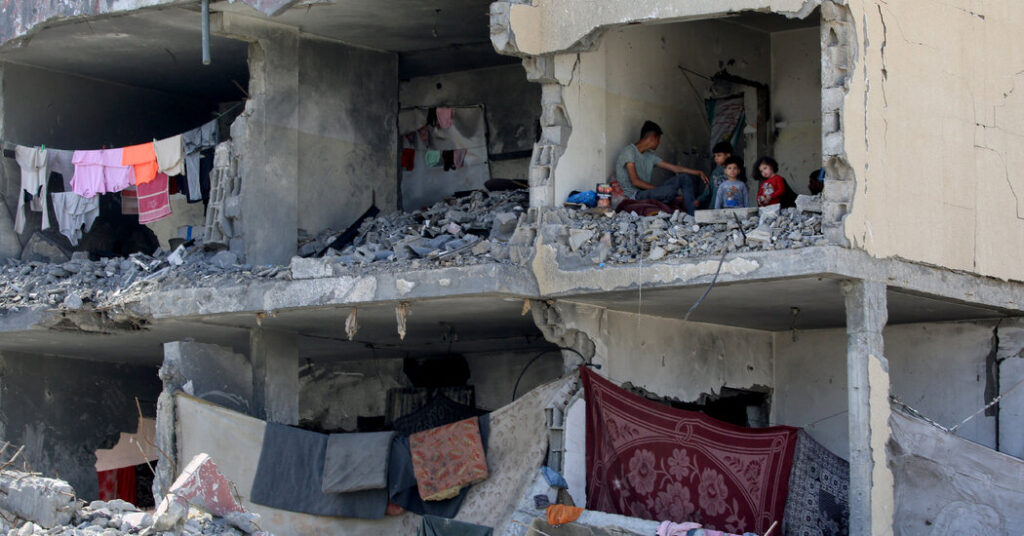In his Warsaw speech two years ago, President Biden declared that the “great fight for freedom” was a battle “between a rules-based order and the rule of violence.”
We'll see if he was serious.
By an overwhelming 13-2 majority, the International Court of Justice ordered Israel to “immediately cease military attacks” in Rafah and open border crossings for the “unhindered delivery” of humanitarian assistance. But while the court's order is binding, it has no enforcement mechanism and is effectively up to the UN Security Council, and in particular President Biden, to enforce it.
This should be an easy decision, giving Biden a chance to salvage his failed Gaza policy. Because in this case, Biden and the International Court of Justice are fundamentally aligned. Both are against a full-scale invasion of Rafah and want Israel to allow more humanitarian aid. But Biden has been ignored and squelched by Prime Minister Benjamin Netanyahu for seven months. The question now is whether the court's ruling will give Biden the courage to pressure Israel to comply with the ruling.
Biden's influence is clear. He could use the moratorium on big bomb deliveries to halt all offensive weapons deliveries to Israel as long as it violates international law. This would still allow defensive weapons deliveries and ensure Israel is not in grave danger from missiles or other threats, a step 40 House Democrats, including Rep. Nancy Pelosi, called for last month.
President Ronald Reagan, faced with a similar situation during Israel's devastating 1982 invasion of Lebanon (leading to the rise of Hezbollah), suspended some arms transfers and warned that U.S.-Israeli relations were at risk. This worked. It may not be in Biden's DNA to exert similar pressure.
Biden has a deep knowledge of international relations and has generally conducted a wise foreign policy, especially in Asia, but his missteps in the Middle East have undermined America's moral authority. Many around the world saw nothing but hypocrisy in providing arms and diplomatic protection for Netanyahu's Gaza war while defending a “rules-based international order” in Ukraine against an enemy that violates international law, undermines the norms of warfare, attacks infrastructure and tortures civilians.
Frankly, Biden's Gaza policy has failed morally, practically, and politically. It made the United States complicit in civilian deaths, including starving children. It weakened the United States' position in Ukraine. In my view, it has not helped Israel eliminate Hamas, rescue hostages, or improve its long-term security. And it may be hurting Biden's chances of winning key states like Michigan.
One sign of Biden's failure is the temporary pier he ordered the U.S. military to set up to deliver aid to the Gaza Strip.
Instead of pressing Israel hard to allow the thousands of trucks at the border into Gaza, the Biden administration effectively blocked a U.N. resolution in December that would have set up a U.N. system to get around Israel's screening bottlenecks, leaving children to starve.
President Biden then sent in the U.S. military to build a pier, which reportedly cost $320 million. More than two months later, the pier is complete, but it has had little effect without a proper system to get food to those who actually need it. The pier was merely an expensive gesture, a substitute for action, not a call for action.
Meanwhile, the World Food Programme has warned of full-scale famine in parts of Gaza, and the UN says the situation has worsened since Israel launched Operation Rafah. “Very little fuel or aid is reaching anywhere in Gaza,” the World Food Programme said this week, adding that “the humanitarian operation in Gaza is on the verge of collapse.”
In its arguments in court, Israel made a legitimate point: “The fact remains that the city of Rafah is also a Hamas military stronghold and continues to pose a serious threat to Israel and its people.” Israelis are devastated by the brutality of the October 7 terrorist attacks, and their determination to eradicate any remnants of Hamas is understandable.
But as I have argued, pacifying Rafah is unlikely to achieve that, nor would it free the hostages (the US reportedly believes Hamas leadership is in Khan Yunis, not Rafah). Prolonging this war serves Prime Minister Netanyahu's interests, but not those of Israelis, Americans or Palestinians.
This week, when the prosecutor of the International Criminal Court sought arrest warrants for Israeli and Hamas leaders on war crimes charges, Biden raged, calling the actions “outrageous.” I wish Biden had focused on getting food to hungry children, but now he has a chance to again comply with international law and move us out of this policy nightmare.
Without a clear plan for a post-conflict Gaza or West Bank, Biden's Middle East policy is in disarray. His goal of a three-way deal with Israel, Saudi Arabia and the US could provide a way out of this mess, but that seems unlikely and there is no obvious Plan B.
So I suggest it's time for Biden to take a firm stance and forego all offensive weapons in an imperfect approach that could be a step toward mitigating humanitarian catastrophe, ending the war, and preserving what he claims to be a “rules-based order.”



